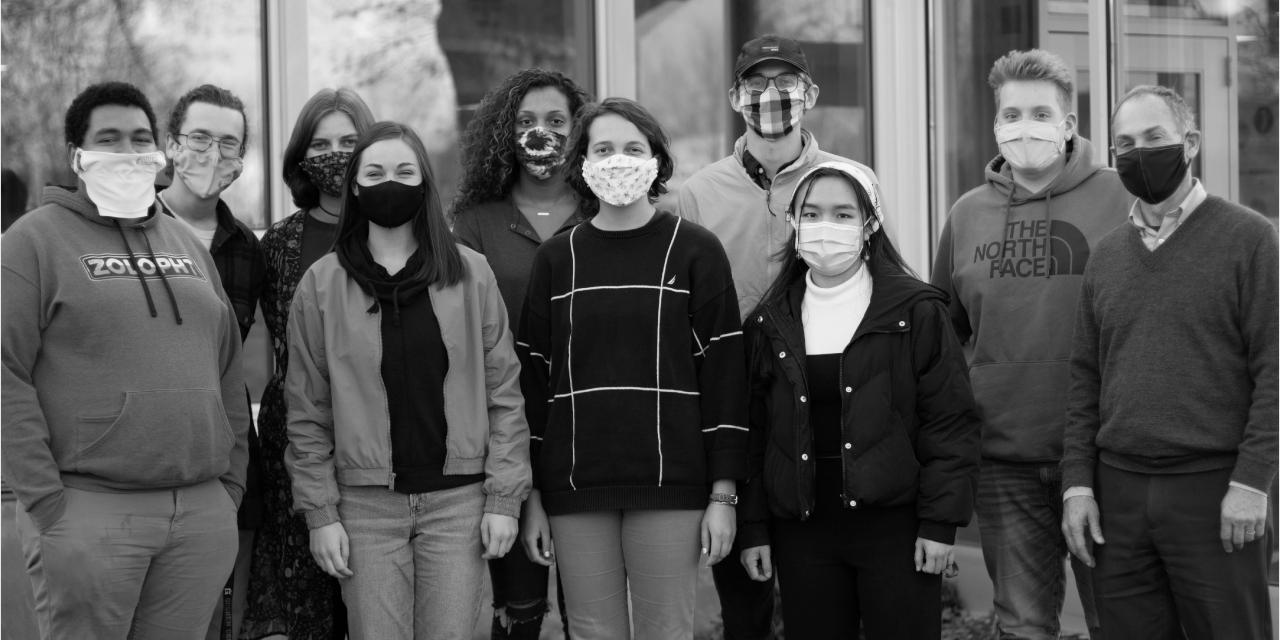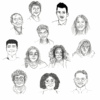A note from the executive editor: Last week in our final critique of the semester, faculty advisor Duane Stoltzfus spoke to the higher calling of journalists in a time when democracy is being threatened. I was inspired by his words and thought you might be too. In fact, what is it like to be a journalist in this day and age? Here is how The Record editors responded.
Duane Stoltzfus, The Record Advisor
A framed poster in the newsroom of the Center for Communication Studies reminds us that The Record has enjoyed editorial independence since 1912, the year when faculty members stepped aside as editors.
In keeping with a long tradition, the Goshen College administration doesn’t order up news stories or carry out a prior review before publication (though President Rebecca Stoltzfus has been amazingly generous in serving as a source for articles).
As faculty advisor, I read articles at the same time as everyone else across campus.
On Fridays, we have a critique where I get to comment on highlights of the week and areas for improvement.
I’ve been telling Mackenzie Miller, the executive editor, and her staff how important their contributions are to the life of the college, especially their coverage of the pandemic: tracking numbers, reporting on policies, describing life in quarantine, soliciting logbooks.
This is work that captures what it means to be a Goshen College student during the coronavirus. Sometimes journalists hold up a mirror in this way; and sometimes they are called to step into the breach when the stakes are higher.
At this moment in American history, when the executive branch appears ready to sacrifice democracy, when many in the legislative branch keep silent, and when the high court in the judicial branch stands by, it falls to the fourth estate to challenge claims that President-elect Joe Biden stole the election from President Donald Trump.
The New York Times, for example, called election officials of both parties in every state to assemble a forceful rebuke of Trump’s false claims of fraud.
With Americans standing on the brink of authoritarianism, journalists are on the front lines, reminding us that the keyboard is as powerful an instrument for good as ever.
Greta Klassen, Copy Desk Chief and Funnies Editor
I self-identify as a very gullible person. I once fervently believed that my RA had dated the famous singer Khalid in high school, even though there was absolutely no physical evidence, so yeah…. pretty gullible.
Thankfully, I know this about myself. I also know that I am never satisfied with a simple, surface-level answer. Hopefully, my determination and curiosity cancel out my gullibility – but just in case they don’t, I have decided not to give mental space to any news source that gives half-truths and spews lies.
Being a journalist is not only about what you produce, but what you consume. I struggle just as much as anyone with social media and the fake news that is constantly circulating, but when I am in journalist mode, I always start with the facts. What do I know for sure? What can I confirm? And then, I try to include the nuance. How does this seemingly unimportant occurrence relate to the bigger picture? What trends does this follow?
I have found that many times, the true story is not in what happened, but in why it happened, and what it all connects to. The world is not black and white, and if anyone tries to tell you it is, ignore them. Right now, more than ever, we all need a little gray.
Kristin Jantzen, Arts Editor
Existing in the journalism realm this semester has really called for a lot of creativity. COVID-19 has really changed the way our world is functioning at the moment, and as a result, we’ve had to adapt the way we’ve covered it. I know my page has looked a lot different than some of the previous arts pages. There’s been a lot of coverage of virtual events and we’ve also been able to look more in-depth at individual artists.
Graysen Cockerham, Perspectives Editor
My passion for writing has been present since I was a little girl; however, my passion for the game of basketball has always overshadowed my ability to explore a career in journalism. I took a leap of faith and joined The Record this semester – oddly enough, during one of the most turbulent years in American history. Writing meaningful and timely stories in the midst of a global pandemic, a controversial election and a demand for police reform has forced me to mature quickly: as a woman and as a journalist. Humans are born opinionated. When we see something, our first instinct is to judge the situation and the ones involved. For this reason, I am grateful to have assumed the role of perspectives editor, where opinion-based stories are not only welcomed, but encouraged.
Nathan Pauls, Layout Editor and Digital Editor
Being a journalist this semester has been intense. There were many times on Wednesday nights when, as layout editor, I had to wait for our news editor, Nick Yutzy, to add the last crucial detail concerning the coronavirus before I could finish laying out the page. As digital editor, I worked hard to update our readers through social media on the new COVID-19 numbers as they surged or dropped on campus. Despite all of these challenges being on staff has been rewarding knowing that The Record provides a crucial look into campus life and administration in such a historical period.
William Troyer, Sports Editor
Being a journalist this semester has been wild. I know this from writing and covering sports at Goshen College. I think it is so unusual because nothing is set in stone. Games and events have moved around more this year than probably the last five years combined at Goshen College. That being said, I think that is what makes journalists so important during this time. They are consistent and always strive to report the truth.
Zachariah Begly, Features Editor
Journalism in 2020 has been like hiking a mountain for the first time. The journey is exhausting, but you’re on it for reasons beyond personal gain. Journalism is education, though in 2020 it was more. I found myself this year looking a little bit harder, and digging a little bit deeper into stories about the pandemic and the election. At times it became a struggle because the pandemic stripped many stories but breathed life into new ones that were equally as challenging and rewarding. This election felt distinct and the coverage formed to meet that call. Journalism is about learning, but in 2020 it became unique to meet the time.
Nick Yutzy, News Editor
I miss the times when the phrase, “journalism is dead,” was referencing the perceived replaceability of print news. Now, when I think of this phrase, I can’t help but to link it to our sitting President of the United States.
The growing distrust among journalists, I believe, is one of the greatest threats to our democracy.
And as challenging as it may be to work for a newspaper in 2020, it has made me realize more than ever that this is the exact reason why we are not replaceable — why the establishment of news media was created in the first place: to question authority, give voices to those who haven’t been heard and inform communities.




